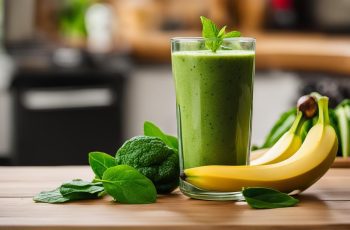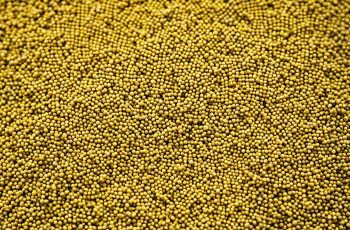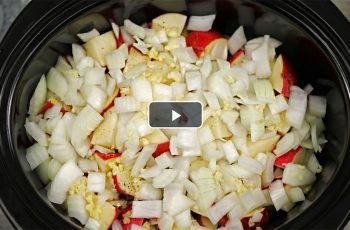Adding probiotics to your diet may offer many health benefits. Probiotics are live microorganisms that have health benefits when consumed. They improve digestive health, reduce depression, promote heart health, boost immunity, and may even give you better-looking skin. Consuming probiotics in supplement form is one popular way to get them, but you can also get them from fermented foods. Here is a list of 11 probiotic foods that are super healthy.
Probiotic Rich Foods
- Probiotics are live microorganisms that provide several health benefits.
- They can improve digestion, reduce depression, and promote heart health.
- Consuming probiotics in fermented foods is a natural way to add them to your diet.
- Yogurt, kefir, sauerkraut, and tempeh are all excellent sources of probiotics.
- Incorporating probiotic rich foods into your diet can support gut health and overall well-being.
Yogurt
Yogurt is one of the best sources of probiotics. It is made from milk fermented by probiotics, mainly lactic acid bacteria and bifidobacteria. These beneficial bacteria help restore the natural balance of the gut microbiome and promote optimal digestion.
Not only is yogurt delicious and versatile, but it also offers numerous health benefits. Regular consumption of probiotic yogurt can improve bone health, support heart health, and enhance gastrointestinal function. Additionally, incorporating yogurt into your diet has been associated with a reduced risk of diabetes and certain types of cancer.
Furthermore, probiotic yogurt has been linked to weight management. Some studies suggest that the beneficial bacteria in yogurt may influence the metabolism and help maintain a healthy body weight.
It is important to note that not all yogurts contain live probiotics. To ensure you are getting the maximum probiotic benefits, look for yogurt with active or live cultures. These cultures contain the beneficial bacteria that provide the health benefits associated with probiotics.
So next time you’re in the dairy aisle, reach for a container of probiotic-rich yogurt to support your gut health and enjoy the many health benefits it offers. Your taste buds and your gut will thank you!
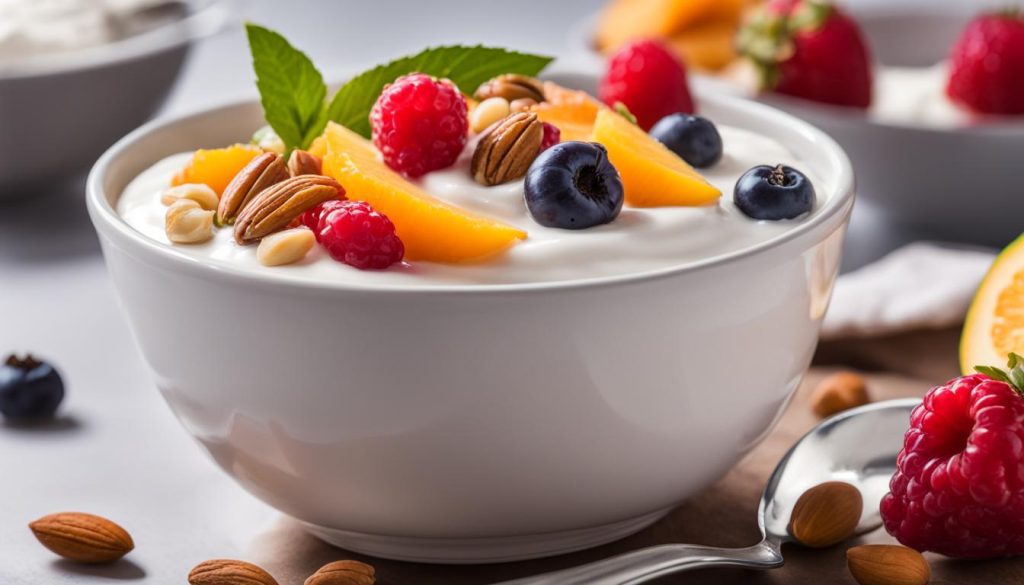
Kefir
Kefir is a delicious and nutritious fermented milk drink that is packed with natural probiotics. It is considered a better source of probiotics compared to yogurt, thanks to its diverse range of friendly bacteria and yeast strains.
Probiotics are live microorganisms that support a healthy gut and overall well-being. They help maintain a balanced digestive system and boost immune function. Kefir contains several major strains of probiotics, making it a potent probiotic-rich food.
What sets kefir apart is its ability to provide a wider variety of probiotics compared to other fermented foods. This diversity of probiotic strains can contribute to enhanced gut health.
In addition to its probiotic content, kefir offers essential nutrients such as calcium, protein, and vitamins B12 and K2. Moreover, the fermentation process in kefir breaks down lactose, making it more tolerable for individuals with lactose intolerance.
Adding kefir to your diet is an excellent way to incorporate natural probiotics into your routine. You can enjoy kefir plain or use it as a base for smoothies, dressings, or overnight oats.
Benefits of Kefir:
- Supports a healthy digestive system
- Boosts immune function
- Provides a wide range of probiotic strains
- Rich in essential nutrients like calcium, protein, and vitamins B12 and K2
- May improve lactose intolerance symptoms
Elevate your gut health by including kefir, a probiotic-rich and fermented food, in your diet. Experience the benefits of natural probiotics and enjoy a healthier gut and overall well-being.
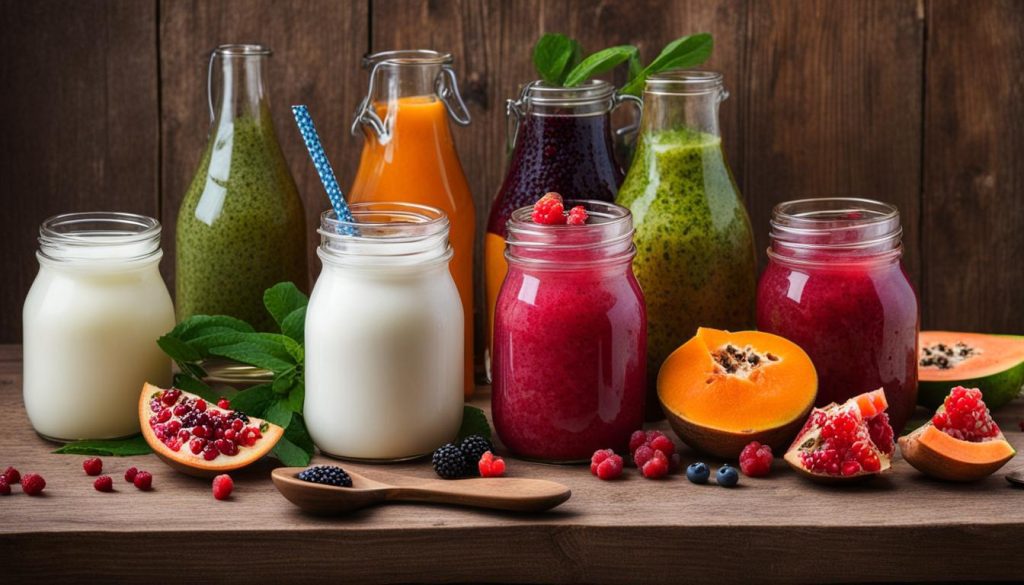
Sauerkraut
When it comes to fermented foods for probiotics, sauerkraut is a popular choice. Made from finely shredded cabbage that has been fermented by lactic acid bacteria, it offers a delicious and tangy flavor that can complement a variety of dishes.
Sauerkraut is not only tasty, but it is also rich in beneficial nutrients. It is a good source of fiber, which supports healthy digestion and can help regulate cholesterol levels. Additionally, sauerkraut provides a significant amount of vitamin C, which boosts the immune system and protects against oxidative stress. It is also packed with vitamin K, which is essential for blood clotting and maintaining strong bones.
What makes sauerkraut so beneficial for gut health are the probiotic strains present in the fermented cabbage. Probiotics are live microorganisms that promote a healthy balance of bacteria in the gut. Consuming sauerkraut can introduce these beneficial bacteria into your digestive system, supporting optimal gut health.
When choosing sauerkraut for its probiotic benefits, it’s essential to select unpasteurized varieties. Pasteurization kills off the live bacteria, reducing the probiotic content. Look for sauerkraut brands that mention “live cultures” or “contains active bacteria” on the label to ensure you’re getting the maximum probiotic benefits.
To fully appreciate the probiotic benefits of sauerkraut, consider incorporating it into your meals. It can be enjoyed as a side dish, added to salads, sandwiches, or even used as a topping on hot dogs and sausages. The versatility of sauerkraut makes it an easy and tasty addition to your diet.
Tempeh
When it comes to natural sources of probiotics and adding probiotic-rich foods to your diet, tempeh is an excellent choice. This fermented soybean product has gained popularity as a high-protein substitute for meat. Not only does it provide a satisfying and flavorful option for vegans and vegetarians, but it also offers numerous health benefits.
One noteworthy advantage of tempeh is its decent amount of vitamin B12. This essential nutrient is predominantly found in animal products, making tempeh a valuable source for individuals following a plant-based diet.
However, the benefits of tempeh extend beyond its vitamin B12 content. The fermentation process involved in the production of tempeh also offers additional advantages. Fermentation helps lower the levels of phytic acid in soybeans. Phytic acid can hinder the absorption of important minerals like iron and zinc. By reducing phytic acid through fermentation, tempeh becomes a more bioavailable source of these vital minerals.
Integrating tempeh into your meals is relatively simple. Its firm texture and nutty flavor make it a versatile ingredient that can be sautéed, grilled, or added to stir-fries, salads, and sandwiches. With its natural probiotics and nutritional benefits, tempeh is an excellent addition to a well-rounded diet.
Conclusion
Probiotics play a crucial role in maintaining gut health and improving overall well-being. By incorporating probiotic-rich foods into your diet, you can reap the benefits of a healthy digestive system and boost your immune function.
Yogurt, kefir, sauerkraut, and tempeh are some of the best sources of probiotics. These foods contain live bacteria and yeast that promote a balanced gut microbiome, aiding in digestion and nutrient absorption.
Adding probiotic-rich foods to your daily meals is a simple yet effective way to optimize your gut health. These natural sources of probiotics offer a diverse range of friendly bacteria and contribute to a healthy microbiome.
By prioritizing probiotics in your diet, you can support a well-functioning digestive system, strengthen your immune system, and improve your overall health and well-being.
FAQ
What are probiotic rich foods and why are they beneficial for gut health?
Probiotic rich foods are those that contain live microorganisms that have health benefits when consumed. They improve digestive health, boost immunity, and promote overall wellbeing. Incorporating probiotic rich foods into your diet can optimize your gut health and support a healthy microbiome.
What are the benefits of consuming probiotic rich foods?
Consuming probiotic rich foods can improve digestion, reduce the risk of certain diseases such as diabetes and cancer, enhance heart health, support weight management, boost immunity, and even contribute to better-looking skin.
What are some examples of probiotic rich foods?
Some examples of probiotic rich foods include yogurt, kefir, sauerkraut, tempeh, kimchi, pickles, kombucha, miso, natto, and sourdough bread.
How can I incorporate probiotic rich foods into my diet?
You can incorporate probiotic rich foods into your diet by consuming yogurt as a snack or adding it to smoothies, using kefir as a base for smoothies or salad dressings, enjoying sauerkraut as a topping or side dish, and incorporating tempeh into stir-fries or sandwiches. Additionally, you can try out different fermented foods and include them in your meals.
Is yogurt a good source of probiotics?
Yes, yogurt is one of the best sources of probiotics. It is made from milk fermented by probiotics, mainly lactic acid bacteria and bifidobacteria. However, not all yogurt contains live probiotics, so it is important to choose yogurt with active or live cultures.
What is kefir and why is it a good source of probiotics?
Kefir is a fermented probiotic milk drink that contains several major strains of friendly bacteria and yeast. It is a better source of probiotics than yogurt and offers a more diverse and potent probiotic profile. Kefir is often well-tolerated by people with lactose intolerance.
Why is sauerkraut a good source of probiotics?
Sauerkraut is finely shredded cabbage that has been fermented by lactic acid bacteria. It is rich in fiber, vitamins C and K, and antioxidants. Choosing unpasteurized sauerkraut that contains live bacteria ensures maximum probiotic benefits.
What are the benefits of consuming tempeh as a probiotic-rich food?
Tempeh is a fermented soybean product that serves as a good source of probiotics. In addition to probiotics, it is also a notable source of plant-based protein and contains vitamin B12, which is mainly found in animal products. Fermentation of tempeh also lowers the amount of phytic acid in soybeans, increasing the absorption of minerals like iron and zinc.
Are there any other natural sources of probiotics besides yogurt, kefir, sauerkraut, and tempeh?
Yes, besides yogurt, kefir, sauerkraut, and tempeh, other natural sources of probiotics include kimchi, pickles, kombucha, miso, natto, and sourdough bread. These foods can add variety to your diet while providing beneficial probiotics.
Should I consume probiotic rich foods or take probiotic supplements?
While both probiotic rich foods and probiotic supplements can provide health benefits, consuming probiotic rich foods is generally recommended because they offer a wider range of probiotic strains and are more well-rounded sources of other nutrients. However, if you have specific health concerns or conditions, it is best to consult with a healthcare professional for personalized advice.
How much of probiotic rich foods should I consume daily?
There is no strict guideline for the exact amount of probiotic rich foods you should consume daily. However, incorporating them into your regular diet by consuming them a few times a week can provide benefits for gut health and overall wellbeing.

